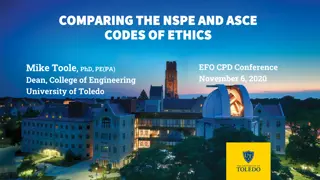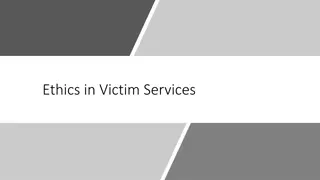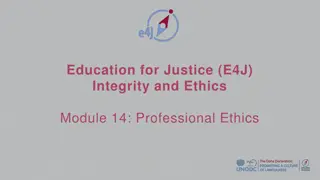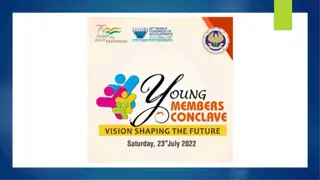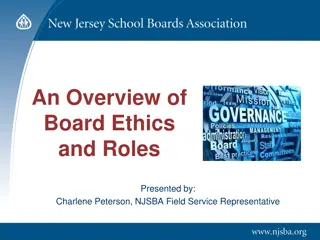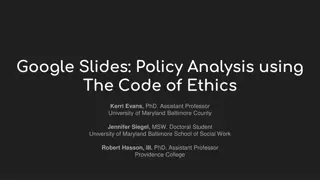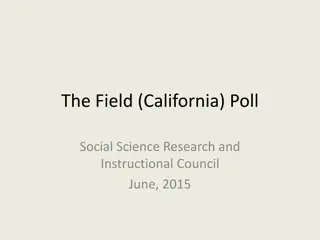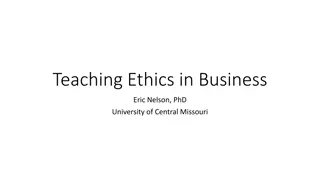Applying the NSPE Code of Ethics to Re-Opening University Campuses
Explore the importance of engineering codes of ethics, delve into the NSPE Code of Ethics, and examine ethical challenges in re-opening university campuses amid a pandemic. Gain insights into managerial competence, ideologies, and ethical decision-making in the engineering field.
Download Presentation

Please find below an Image/Link to download the presentation.
The content on the website is provided AS IS for your information and personal use only. It may not be sold, licensed, or shared on other websites without obtaining consent from the author. Download presentation by click this link. If you encounter any issues during the download, it is possible that the publisher has removed the file from their server.
E N D
Presentation Transcript
APPLYING THE NSPE CODE OF ETHICS TO APPLYING THE NSPE CODE OF ETHICS TO RE RE- -OPENING UNIVERSITY CAMPUSES OPENING UNIVERSITY CAMPUSES Mike Toole, PhD, PE(PA) Dean, College of Engineering University of Toledo EFO CPD Conference November 6, 2020
OVERVIEW Why engineering codes of ethics are needed Flyover of the NSPE Code of Ethics Four historical examples Benefits vs. risks Appropriate communication Ethical issues in re-opening college campuses
LEARNING OBJECTIVES Gain perspectives on why engineering codes of ethics are needed Increase understanding of portions of the NSPE Code of Ethics and how they are relevant both to historical examples and to a specific real and timely decision. Learn how applying the NSPE Code of Ethics to operational issues during a pandemic can raise questions about managerial competence and the role of ideologies.
WHY ENGINEERING CODES OF ETHICS? Engineers have special responsibilities in society All humans have self-interests U.S. engineers work in a capitalistic system and often for a for-profit employer University Presidents also have self-interests and also work for employers with goals for advancing the institution
OVERVIEW OF THE NSPE CODE OF ETHICS Preamble I. Fundamental Canons (6) II. Rules of Practice Deep dive into the first 5 Fundamental Canons III. Professional Obligations Deep dive into Fundamental Canon 6 (and others)
ETHICAL ISSUES RELATING TO BENEFITS VS. RISKS Judgement chances and consequences of failure Communication during judgement and after judgement or failure Historical engineering ethics cases CitiCorp Center Tower Challenger Disaster Flint Water Crisis Boeing 737
APPLYING THE NSPE CODE OF ETHICS TO APPLYING THE NSPE CODE OF ETHICS TO RE RE- -OPENING UNIVERSITY CAMPUSES OPENING UNIVERSITY CAMPUSES Option 1: Keep campus closed Option 2: Re-open campus
OPTION 1: KEEP CAMPUS CLOSED All remote instruction Most faculty and staff continue to work remotely No students in dorms or dining halls No sports or other in-person extra-curricular activities
OPTION 2: RE-OPEN CAMPUS Resume some F2F classes Most faculty and students on campus Students in dorms and dining facilities Competitive sports? F2F student organization activities?
HIGH STAKES Quality of instruction Enrollment tuition and state funding Students on campus auxiliary revenues and local economy support Student morale Health of students, faculty, staff, local community Relationships with government officials
III. PROFESSIONAL OBLIGATIONS 1. ENGINEERS SHALL BE GUIDED IN ALL THEIR RELATIONS BY THE HIGHEST STANDARDS OF HONESTY AND INTEGRITY. Codes of Ethics are NOT the low bar . Codes of Ethics are frameworks that should guide and inspire the most principled and commendable behavior in all contexts
1.B. ENGINEERS SHALL ADVISE THEIR CLIENTS OR EMPLOYERS WHEN THEY BELIEVE A PROJECT WILL NOT BE SUCCESSFUL. Will implies certainty But most situations have uncertain outcomes due to missing information and some degree of randomness This pandemic has a LOT of uncertainty so estimating the chances of a successful re-opening was challenging!
RE-OPENING UNKNOWNS Asymptomatic positive cases who will arrive on campus New cases due to contact with local community New cases from transmission in classrooms, labs, dorms, dining halls, social spaces Disinfection Social-Distancing Mask wearing Other behavior
2. ENGINEERS SHALL AT ALL TIMES STRIVE TO SERVE THE PUBLIC INTEREST. A. ENGINEERS ARE ENCOURAGED TO PARTICIPATE IN CIVIC AFFAIRS AND WORK FOR THE ADVANCEMENT OF THE SAFETY, HEALTH, AND WELL-BEING OF THEIR COMMUNITY. Engineers serve Society, not merely sets of individual stakeholders, including themselves or their employers
FUNDAMENTAL CANONS ENGINEERS, IN THE FULFILLMENT OF THEIR PROFESSIONAL DUTIES, SHALL: 1. Hold paramount the safety, health, and welfare of the public. 2. Perform services only in areas of their competence. 3. Issue public statements only in an objective and truthful manner. 4. Act for each employer or client as faithful agents or trustees. 5. Avoid deceptive acts. 6. Conduct themselves honorably, responsibly, ethically, and lawfully so as to enhance the honor, reputation, and usefulness of the profession.
IS THERE WIGGLE ROOM IN SHALL HOLD PARAMOUNT .? Is one additional COVID case or death unacceptable? Freeway analogy Engineers prioritize safety and health after balancing expected benefits with acceptable risks Self-audit question 1: Are you appropriately prioritizing the health and safety of everyone affected by your decision?
WHAT ARE IMPLICATIONS OF OF THE PUBLIC? Hold paramount the safety, health, and welfare of the public Are construction and maintenance workers considered part of the Public? American Institute of Architects: No Does Rule 1.a help clarify? If engineers judgment is overruled under circumstances that endanger life or property, they shall notify their employer or client and such other authority as may be appropriate.
2. ENGINEERS SHALL PERFORM SERVICES ONLY IN THE AREAS OF THEIR COMPETENCE. A. ENGINEERS SHALL UNDERTAKE ASSIGNMENTS ONLY WHEN QUALIFIED BY EDUCATION OR EXPERIENCE IN THE SPECIFIC TECHNICAL FIELDS INVOLVED. Self-audit question 2: Are you really qualified to make this decision or to seek opportunities where you might need to make that decision? Does managerial competence include operations during a pandemic? Do aspiring engineers need to curb their enthusiasm?
2.B. ENGINEERS SHALL NOT AFFIX THEIR SIGNATURES TO ANY PLANS OR DOCUMENTS DEALING WITH SUBJECT MATTER IN WHICH THEY LACK COMPETENCE, NOR TO ANY PLAN OR DOCUMENT NOT PREPARED UNDER THEIR DIRECTION AND CONTROL. Should an engineer university president stamp a re-opening plan prepared by: Residential Life Student Affairs Athletics the Faculty Union Marketing and Communications
3. ENGINEERS SHALL ISSUE PUBLIC STATEMENTS ONLY IN AN OBJECTIVE AND TRUTHFUL MANNER. A. ENGINEERS SHALL BE OBJECTIVE AND TRUTHFUL IN PROFESSIONAL REPORTS, STATEMENTS, OR TESTIMONY. THEY SHALL INCLUDE ALL RELEVANT AND PERTINENT INFORMATION IN SUCH REPORTS, STATEMENTS, OR TESTIMONY, WHICH SHOULD BEAR THE DATE INDICATING WHEN IT WAS CURRENT. B. ENGINEERS MAY EXPRESS PUBLICLY TECHNICAL OPINIONS THAT ARE FOUNDED UPON KNOWLEDGE OF THE FACTS AND COMPETENCE IN THE SUBJECT MATTER.
APPROPRIATE COMMUNICATION IS CHALLENGING IN THE FACE OF: Missing data Unclear causalities Unpredictable behavior Severe consequences Ideologies Self-audit question 3: Am I communicating appropriately in light of so many unknowns and pressures?
3C. ENGINEERS SHALL ISSUE NO STATEMENTS, CRITICISMS, OR ARGUMENTS ON TECHNICAL MATTERS THAT ARE INSPIRED OR PAID FOR BY INTERESTED PARTIES, UNLESS THEY HAVE PREFACED THEIR COMMENTS BY EXPLICITLY IDENTIFYING THE INTERESTED PARTIES ON WHOSE BEHALF THEY ARE SPEAKING, AND BY REVEALING THE EXISTENCE OF ANY INTEREST THE ENGINEERS MAY HAVE IN THE MATTERS. 4. ENGINEERS SHALL ACT FOR EACH EMPLOYER OR CLIENT AS FAITHFUL AGENTS OR TRUSTEES. A. ENGINEERS SHALL DISCLOSE ALL KNOWN OR POTENTIAL CONFLICTS OF INTEREST THAT COULD INFLUENCE OR APPEAR TO INFLUENCE THEIR JUDGMENT OR THE QUALITY OF THEIR SERVICES.
CHALLENGING FACTORS Ideologies of Faculty vs. University President vs. University Trustees vs. elected officials Local vs. State vs. Federal officials Attitudes weighing human health vs. economic health Attitudes towards science, scientists, health professionals Hopeful vs. realistic expectations about behavior Self-Audit question 4: Am I considering and disclosing my personal ideologies?
SUMMARY Codes of ethics can provide guidance on issues and contexts not specifically addressed in the Code. Applying the NSPE Code of Ethics to re-opening university campuses during the pandemic suggests four self-audit questions: 1. Am I appropriately prioritizing the health and safety of everyone affected by my decision? 2. Am I really qualified to make this decision or to seek opportunities where I might need to make that decision? 3. Am I communicating appropriately in light of so many unknowns and pressures? 4. Am I considering and disclosing my personal ideologies?
WE ARE REMINDED Codes of Ethics provide important guidelines to balance safety and health against everything else. Engineers serve the public interest over individual stakeholders.
THANK YOU AND BEST WISHES FOR YOUR SUCCESSFUL AND ETHICAL OPERATIONS Feedback? Please contact me at michael.toole@utoledo.edu







